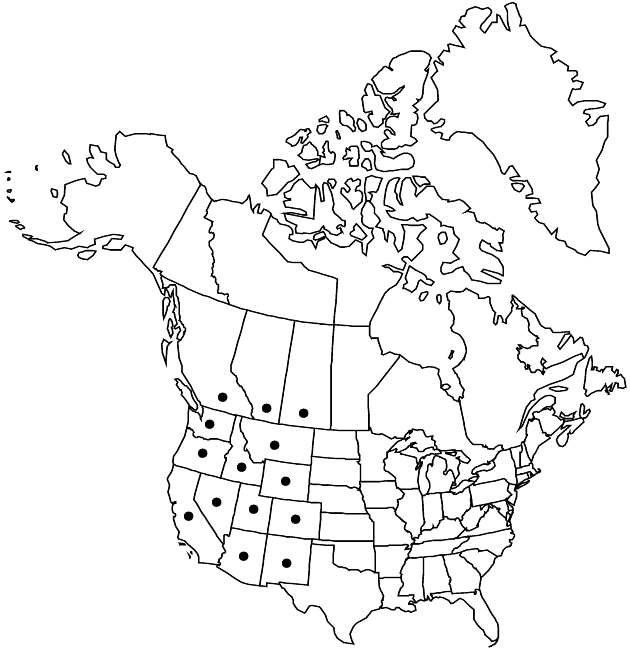Difference between revisions of "Symphyotrichum bracteolatum"
Phytologia 77: 276. 1994.
imported>Volume Importer |
RevisionBot (talk | contribs) m (Bot: Adding category Revised Since Print) |
||
| Line 68: | Line 68: | ||
}}<!-- | }}<!-- | ||
| − | -->[[Category:Treatment]][[Category:Symphyotrichum sect. Occidentales]] | + | --> |
| + | |||
| + | [[Category:Treatment]] | ||
| + | [[Category:Symphyotrichum sect. Occidentales]] | ||
| + | [[Category:Revised Since Print]] | ||
Revision as of 18:47, 23 July 2020
Perennials 40–100 cm, cespitose; short-rhizomatous. Stems 1–10+, ascending to erect, glabrous or sparsely puberulent. Leaves thin, margins entire or sometimes serrate, apices acute; basal withering by flowering, petiolate, blades narrowly lanceolate, 60–200 × 10–20 mm, attenuate or cuneate, margins usually entire, sometimes serrate, apices acute, faces glabrous or sparsely puberulent; proximalmost cauline sometimes withering by flowering, sessile, blades narrowly lanceolate, 50–150 × 8–25 mm, bases cuneate, often auriculate, apices acute; distal sessile, blades linear to narrowly lanceolate, 20–120 × 3–20 mm, bases cuneate, often auriculate, apices acute. Heads in racemiform to narrow, paniculiform arrays, branches usually to 10 cm. Peduncles sparsely hairy, bracts linear to lanceolate. Involucres campanulate, 5–8 mm. Phyllaries in 3–5 series, often spreading, oblanceolate (outer) to linear (inner), subequal, outer indurate less than 1/2, bases outer variable, inner scarious, margins entire, scabrous to ciliolate, green zones oblanceolate to elliptic, apices acute to obtuse, often spreading, faces glabrous or sparsely puberulent. Ray florets 20–40; corollas white to pink, laminae 7–15 × 1–2 mm. Disc florets 35–60+; corollas yellow, 4.5–5 mm, lobes triangular, 0.5–0.75 mm. Cypselae brown, cylindric to obovoid, not compressed, 2.5–3.5 mm, 1–2-nerved, faces hairy; pappi white, 5–6 mm. 2n = 16, 32, 48, 64.
Phenology: Flowering Jul–Aug.
Habitat: Moist to wet sunny places, wet thickets, along streams and ditches
Elevation: 500–3100 m
Distribution

Alta., B.C., Sask., Ariz., Calif., Colo., Idaho, Mont., Nev., N.Mex., Oreg., Utah, Wash., Wyo.
Discussion
Selected References
None.